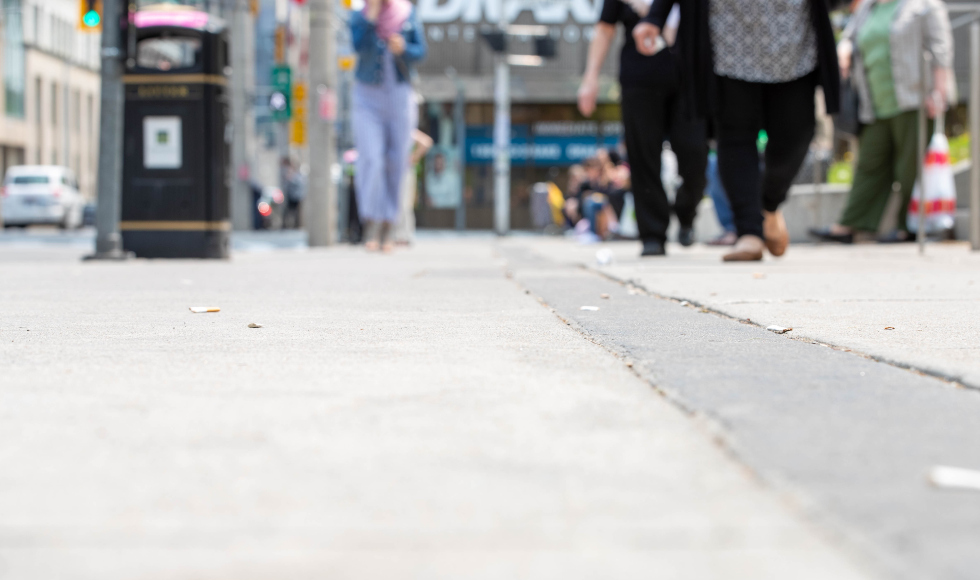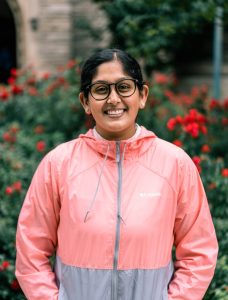Class project gets Hamilton talking about toilets

Students’ social media campaign draws attention to an issue that’s only gotten worse with COVID-19 closures: a lack of public bathrooms, in Hamilton and other cities.
The closure of many public buildings because of the COVID-19 pandemic has shone a light on something most people don’t think about: “toilet privilege,” and equitable access to bathroom facilities.
 So, when the opportunity arose for Fairuz Karim, a fifth-year science student, to choose an experiential learning project as part of an advocacy course in McMaster’s Sustainable Future Program, the topic seemed obvious. The project had to address a pressing local sustainability challenge – and bathroom access was an issue that was getting little attention.
So, when the opportunity arose for Fairuz Karim, a fifth-year science student, to choose an experiential learning project as part of an advocacy course in McMaster’s Sustainable Future Program, the topic seemed obvious. The project had to address a pressing local sustainability challenge – and bathroom access was an issue that was getting little attention.
“I’ve talked with family back in Bangladesh and New York, and I’ve witnessed distress from my own aging parents who are finding it really hard to navigate public spaces here because they can’t be sure there’s a washroom,” she explains.
Karim and members of her interdisciplinary team, Charnelle Bailey (science), India Groundwater (engineering), Tanya Sadana (social sciences) and Zoe Spronk (science) decided to create an advocacy plan and a resource that a partnering organization could use.
Supported by their community partner from YWCA Hamilton, Violetta Nikolskaya, Karim and her team developed a social media campaign to get people talking about toilets.
“Social media is a powerful advocacy tool because people engage with issues that are important to them,” says Spronk.
Access to public washrooms is an intersectional issue – it affects some people more than others, depending on their intersecting personal characteristics and identities, Sadana explains. “While someone may engage with the content because of how it affects people differently based on gender, they will also learn about how it impacts people based on age.”
As the six-week summer course came to an end, Karim and her team were just getting started. Because of other group members’ previous commitments, Karim offered to continue the group’s work on her own, launching “HamOntWashrooms” on Twitter and Instagram September 9.
And, since its launch two weeks ago, the campaign has taken off.
“HamOntWashrooms now has more than 400 followers, 430 likes, 154 shares, and 17 comments,” says Karim. “It’s exciting to see engagement from people and groups locally and across the region and I’m always thrilled when I see local leaders and dignitaries – their involvement in this issue is critical.”
Followers so far include Hamilton Centre MP Matthew Green, Hamilton city councillors and the Barton Village BIA.
To reach an even broader audience and encourage people to share their stories online using the hashtags #WhenNatureCalls in #HamOnt, Karim also wrote an article entitled, “Where are the public washrooms in Hamilton?”, which was published in the Hamilton Spectator on September 19.
There’s still more to do: Karim has more social media posts planned, and wants to bring people together who can transform her advocacy into change in the city.
“In response to my op-ed, Alyssa Lai, a McMaster graduate, Hamilton resident, and former chair of the Hamilton HIVE, called on public institutions to ’bring the right people together’ to create change,” she says. “I’m really inspired by that and want to figure out how I can support making those connections.”
Along with Karim’s work, there are other McMaster initiatives underway to address the issue of public washrooms:
- SUSTAIN 2SS3 — Advocating for Sustainability students are working with the YWCA, Beasley Neighbourhood Association (BNA), and community and city leaders to identify the top questions local opponents have about public washrooms and the most compelling responses to each question.
- McMaster Research Shop students are also working with the BNA to explore municipal responses to public washrooms.
- MacChangers students are working on solutions to challenges posed by the City of Hamilton related to the provision, sanitization and accessibility of public washrooms.
Karim says anyone can be an advocate if they approach issues with awareness and a willingness to listen and learn.
“Be mindful of recognizing your own privilege and listening to the voices of those around you,” she explains. “Our course instructor, Sarah Precious, says, ‘An advocate works and walks alongside those they are advocating for.’ Your voice is important, and we have the power to collectively build a more inclusive, sustainable future.”
Follow Fairuz Karim’s campaign on Twitter and Instagram, and share your stories using the hashtags #WhenNatureCalls in #HamOnt.
Learn more about McMaster’s Sustainable Future Program, including SUSTAIN 2SS3 – Advocating for Sustainability, and follow @macsustain on Instagram, Facebook and Twitter.

